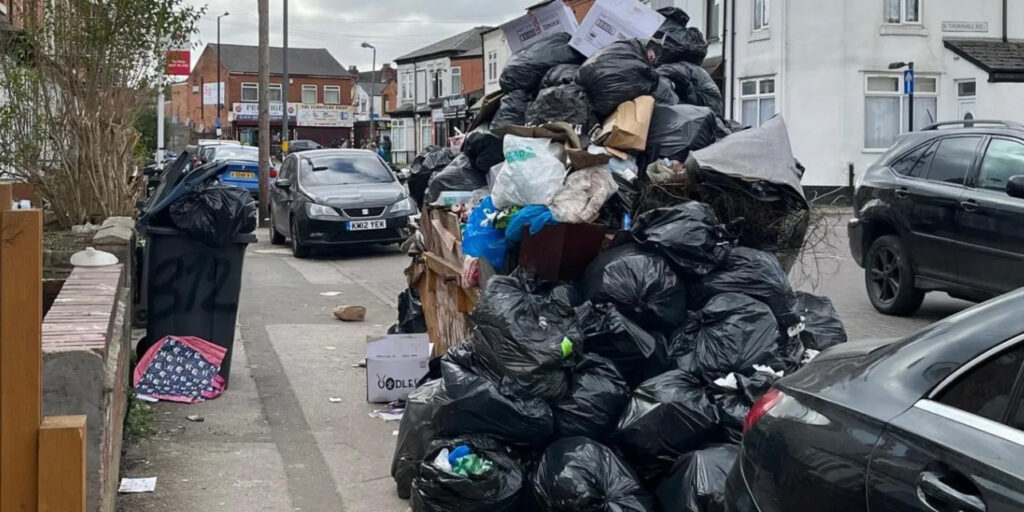The ongoing Birmingham bin strike has left large sections of the city buried under mounds of uncollected rubbish, with the industrial action by Unite union workers now in its sixth week.
Residents in some of Birmingham’s most densely populated and economically deprived wards are facing worsening sanitary conditions, vermin infestations, and a growing sense of inequality.
Birmingham, the UK’s second-largest city with over 1.2 million residents and 400,000 households, has experienced uneven disruption. Inner-city neighbourhoods such as Small Heath, Sparkbrook, Ladywood, and Balsall Heath have been hit hardest by the refuse crisis, while wealthier areas like Harborne have remained largely unaffected.
Dispute Over Pay Triggers Escalation
The bin strike began with intermittent walkouts in January after workers were informed that some roles would be downgraded, resulting in pay cuts. By 11 March, the dispute escalated into an all-out strike involving more than 300 refuse workers. Unite has stated its members would return to work if the council offers a one-off payment and guarantees no further pay reductions.
For weeks, striking workers employed delaying tactics outside Birmingham’s main waste depots to prevent non-union and agency crews from collecting bins. At its peak, only 10% of regular waste collections were being completed, resulting in more than 22,000 tonnes of uncollected waste by early April.
Rat Infestations and Public Health Concerns
Residents and community leaders have raised alarms over worsening hygiene conditions. Streets in high-density areas are overwhelmed by mounting rubbish, with reports of rats and foul smells becoming commonplace. Semir Said from the Green Lane Mosque described “mountains of rubbish” and said the situation had grown dire. The mosque even arranged temporary refuse drop-off points to help locals cope.
Sadia Khan, a local volunteer, said that efforts to clear parks for the Easter weekend were overwhelmed by repeated fly-tipping and the rapid return of litter. “It’s depressing. You clean one day and it’s back the next,” she lamented.
Accusations of a Two-Tier System
A growing number of residents accuse the council of operating a “two-tier waste collection system”, claiming more affluent wards consistently receive better services. In Balsall Heath and the Balti Triangle, frustrations are mounting over neglect and civic inequality. Many believe the situation reflects deeper issues of social disparity within Birmingham.
Alexandra Giddings, a single mother in Ladypool Road, said the bin stench had prevented her from opening windows during warmer days. “The smell’s horrendous,” she said, adding that her son’s asthma had worsened due to the unhygienic conditions.
Government Steps In as Army and Police Intervene
In a major turning point during the fifth week, West Midlands Police intervened to halt picket-line delays, threatening strikers with arrests. This allowed more waste collection wagons to resume operations, supported by Army logistics teams who have helped to coordinate clear-up efforts. As a result, weekly collections have resumed in most areas, and by mid-April, the backlog of uncollected waste had dropped to under 5,000 tonnes.
Still, the damage to Birmingham’s image has been significant. Viral stories about “rats the size of cats” have left a lasting impression, sparking memes and public ridicule. One striking worker apologised on behalf of his colleagues, promising residents that “every effort” would be made to return to work and restore normal services.


